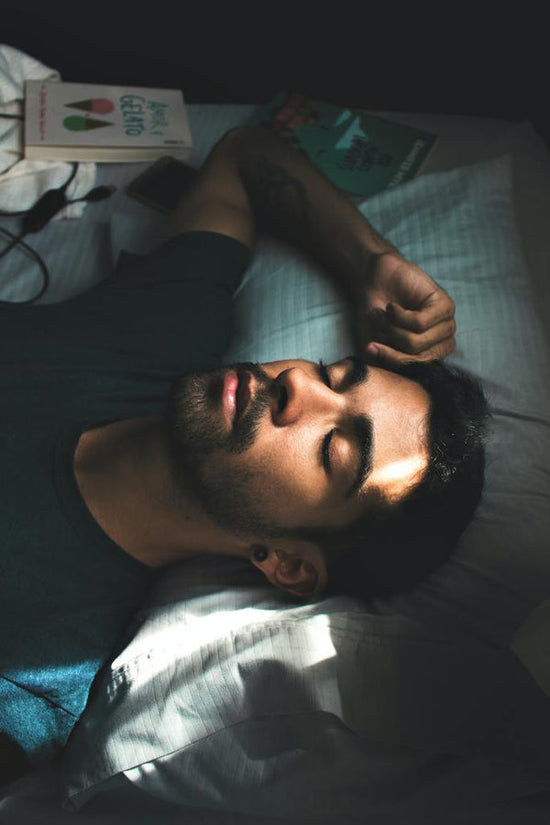
The Power of Better Rest
It's the final moment of the game, your team's success is on the line. You were up stressing the night before and didn't sleep a wink, whereas your competition got a fresh 8 hours of solid sleep. Who will pull through? We all know how it feels to be exhausted. In the heat of the moment, every competitive advantage counts.
Sleep is essential for overall health and well-being, but it is particularly important for athletes. The quality and quantity of sleep can significantly impact an athlete's performance. In this article, we will explore the five performance-enhancing effects of sleep in athletes.

5 Ways Sleep Improves Performance:
- Improved Reaction Time
Reaction time is crucial in many sports, and lack of sleep can significantly impair it. A study published in the Journal of Sports Sciences found that athletes who slept for less than six hours a night had significantly slower reaction times than those who slept for at least nine hours. The sleep-deprived individuals exhibited only roughly 65% of choice reaction speed that the well-rested athletes exhibited. Reaction time is crucial for athletes in sports such as basketball, soccer, and tennis, where quick responses can make all the difference. 2 or 3 hours of sleep maybe the difference between making the buzzer beater or not!
- Faster Recovery
Athletes put their bodies under a great deal of stress during training and competition. Sleep is the body's natural way of repairing itself, and lack of sleep can hinder the recovery process. Muscle fibers tear when working out and do their majority of healing when the body is asleep. Studies have shown that getting enough sleep can help reduce muscle soreness and inflammation, allowing athletes to recover faster and perform better in subsequent training sessions or competitions.
- Increased Endurance
Endurance is a vital component of many sports, including long-distance running, cycling, and swimming. Getting enough sleep can improve endurance by boosting energy levels and reducing fatigue. A study published in the European Journal of Applied Physiology found that athletes who slept for eight hours a night had significantly higher endurance than those who slept for only four hours. When running on low sleep, the body is forced to pump adrenaline to keep up high levels of function. Well-rested athletes have the ability to maintain higher levels of adrenaline than unrested athletes, leading to overall better sports performance for the well-rested athlete.
- Better Cognitive Function
Athletes need to be mentally sharp to make quick decisions and react to changing situations on the field or court. Lack of sleep can impair cognitive function, including memory, attention, and decision-making. Getting enough sleep can help athletes stay mentally alert and perform at their best. A study published in the journal Sleep found that athletes who slept for more than eight hours a night had better cognitive function than those who slept for less than six hours. Making the wrong decision at a split second could turn the tide of a close game significantly. Poor sleep can even impair cognitive function permanently later on in life, see the connections between Alzheimer's disease and poor sleep in a summary of a recent 2023 study.
- Reduced Risk of Injury
Injuries can be a significant setback for athletes, often taking them out of competition for extended periods. Lack of sleep has been linked to an increased risk of injuries in athletes. Sleep helps the body repair and regenerate, reducing the risk of injuries. Studies have shown that athletes who get enough sleep are less likely to get injured than those who don't. Reducing the risk of injury can make the difference between a 2-year career and a 15-year career in the sport that an athlete competes in.
How Can an Athlete Improve Sleep?
Sleep is a vital component of an athlete's performance. It improves reaction time, aids in faster recovery, increases endurance, enhances cognitive function, and reduces the risk of injury. Athletes should prioritize getting enough sleep to optimize their performance and achieve their goals. Here are a few ways an athlete could improve their sleep:
- Invest in better sleep equipment. A professional athlete only goes into competition with only the best equipment. Why not treat sleep equipment the same way? Here is a list of 2023's highest rated sleep products on Amazon, hand-picked by sleep experts from SnoreLessNow. Performance starts in the bedroom before it starts on the field.
-
Start tracking quality of sleep. Tracking sleep sounds like a daunting task, but it's nothing compared to the dedication and consistency of improving skills as an athlete. Consider tracking sleep another important skill - it's been made easy through printable sleep trackers like the one found in this guide. Many regular sleep disturbances go untreated because they go unrecorded - and athletes miss out on capturing critical hours of sleep!
- Addressing causes for sleeplessness. Performance during game time is one thing, but performance in an athlete's personal life is another. There are several contributors to poor performance of sleep, such as anxiety, insomnia, or sleep apnea. Finding clinical solutions for these conditions can significantly improve overall sleep. A toxic relationship can be a strong driver of anxiety and sleepless nights, find solutions here.
Bonus Tip:
Creating the perfect sleep environment is a powerful and effective way to improve performance. Not every action requires spending money to create a better sleep environment, the majority of strategies are free and overlooked. Here are some small ways to start:
- Invest in a Comfortable Mattress and Pillows
One of the most critical factors for a good night's rest is a comfortable mattress and pillows. A mattress that's too soft or too hard can cause discomfort and pain, leading to a restless night's sleep. A back or stomach sleeper may benefit from a harder mattress whereas a side sleeper may benefit from a softer mattress. Invest in a quality mattress and pillows that support your body and ensure a good night's rest.
- Keep Your Room Dark
A dark room is essential for a good night's sleep. Light can disrupt our circadian rhythm, making it harder to fall asleep and stay asleep. The circadian rhythm is responsible for controlling a range of functions, including hormone production, metabolism, and body temperature, among others. It operates on a roughly 24-hour cycle, and disruptions to this cycle can have negative effects on health and wellbeing. Use blackout curtains or an eye mask to keep your room dark, even if there is light pollution outside.
- Reduce Noise
Noise can significantly impact our sleep, making it difficult to fall asleep and stay asleep. If you have anxiety or insomnia, one small noise can be the difference between a night of good sleep or no sleep at all. Use earplugs or a white noise machine to reduce noise levels and create a more peaceful sleep environment...
Find 7 more tips like these to create the perfect sleep environment here.









